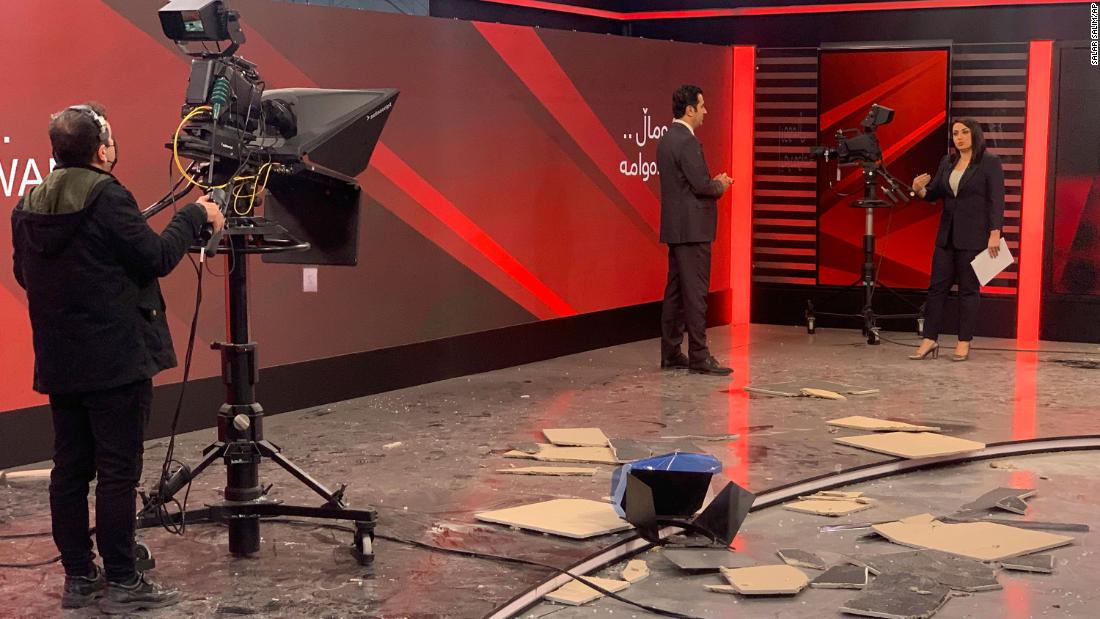Iran’s strike on Iraq puts US in awkward position amid nuclear talks
Iran said it was targeting Israeli “strategic centers” in the northern city of Erbil, but Iraqi-Kurdish authorities said the missiles fell close to a US consulate under construction. Baghdad summoned the Iranian ambassador. The Israeli Prime Minister’s Office refused to comment on the Iranian claim.
“The US was not the intended target,” State Department spokesperson Ned Price said. “Press speculation otherwise is simply wrong.” The White House said the attack targeted a “civilian residence.”
Crude prices last week hit an eight-year high on Russia’s invasion of Ukraine and subsequent Western sanctions on Moscow. The US has so far failed to convince its oil-producing allies in the Organization of Petroleum Exporting Countries (OPEC) to raise supply and help tame the rise in prices.
“The message is clear,” said Saman Vakil, senior research fellow at London’s Chatham House think tank. “That regional stability is not something we should take for granted and that Iran, as a regional state that projects power beyond its border, has the potential to be destabilizing.”
Some Republican politicians weren’t convinced by the Biden administration’s narrative of the events. Lisa McClain, a representative for Michigan, called for an “immediate halt in negotiations with Iran,” while Arkansas Sen. Tom Cotton said sanctions relief should be “off the table.”
“There is probably a signaling at the US as well, since the US is essentially allowing the Israelis to do what they are doing in Syria,” he said. “The Iranians [are saying] they will not tolerate it. They are striking close to the consulate and not at the consulate.”
Paris said it was “reckless” of Iran to conduct the strike amid the nuclear talks but added that it may not have an impact on the negotiations.
“The US is trying to compartmentalize regional issues from the nuclear ones,” said Vakil. “Iran’s accelerating nuclear program remains a problem if not a crisis for the international community.”
Iranian Foreign Minister Hossein Amirabdollahian will visit Russia on Tuesday for “frank and forward-looking talks,” Iran’s Nour News reported. Despite Moscow’s stalling, Tehran on Monday placed the blame for delays on the US, saying the decision to conclude the talks lies with Washington.
The Iranian strike in Iraq could also be aimed at putting pressure on the US to come to an agreement, giving it a preview of what’s to come if nuclear talks fall through, Parsi said. “But the question is why is the pressure on the US and not on the Russians?”
Other top Middle East news
Iran suspends talks with Saudi Arabia after mass execution
Iran suspended negotiations with Saudi Arabia on Sunday, a decision that came ahead of the fifth round of bilateral talks due to take place in Baghdad this week, reported Nour News, an outlet affiliated with Iran’s top security body.
- Background: Iraq has over the last year been mediating talks between Iran and Saudi Arabia, each of whom have backed opposing sides in regional conflicts. On Saturday, Saudi Arabia conducted a mass execution that included Shiite Muslims, a move that was condemned by Shiite-majority Iran, Reuters reported.
- Why it matters: While Iran gave no specific reason for suspending talks with Saudi Arabia, the decision did coincide with Saudi Arabia’s execution of Shiites in the name of terrorism. Proxy fighting between Iran and Saudi Arabia has been a source of great instability in the region. The suspension is a step back in negotiations trying to reel in regional tensions.
Turkey, Greece agree to improve ties after 5-year hiatus
Turkish President Tayyip Erdogan and Greek Prime Minister Kyriakos Mitsotakis agreed in talks on Sunday to improve ties, despite long-running disagreements between the two NATO members, Ankara said.
- Background: After a five-year hiatus, Greece and Turkey agreed last year to resume exploratory talks to address their own differences in the Mediterranean Sea, but little progress has been made so far. The countries came close to confrontation in 2020 when Turkey sent a drilling ship to contested Mediterranean waters.
- Why it matters: The Turkish presidency said both countries have key roles to play in the changing security situation in Europe after Russia’s invasion of Ukraine, and their increased cooperation would have benefits for the region.
Israeli parliament passes controversial ‘citizenship bill’
The Israeli parliament on Friday renewed a controversial law that for years has effectively barred Palestinians from the West Bank and Gaza married to Israelis from becoming citizens. The law will likely face an appeal in Israel’s supreme court.
- Background: The so-called “citizenship bill” was first passed in 2003, during the Second Intifada. It was renewed annually until last July, when the coalition failed to marshal the votes and the ban expired.
- Why it matters: Critics of the law say it’s a racist policy that divides families. Supporters say it is necessary for Israeli security, over fears that would-be terrorists would purposely become Israeli citizens in order to more easily carry out attacks, and in order to preserve Israel’s status as the only Jewish state.
What to watch
The US says there is a cautious optimism in the White House that oil-producing states might ramp up production to bring down crude prices. Becky Anderson spoke to national security correspondent Kylie Atwood about the likelihood of America’s Gulf Arab allies obliging the Biden administration.
Photo of the day
For all the latest world News Click Here

